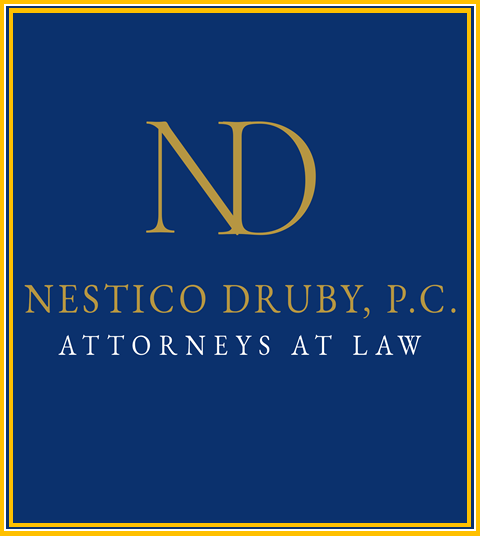Integrity.
Commitment.
Results.
NEWS
Powers of Attorney Powered Down?
Anthony Nestico, Esquire,
Nestico Druby, P.C.
The Pennsylvania Supreme Court recently gave Sun readers something new to worry about as regards estate planning. A good estate plan typically includes a will, an advance directive (which is also known as a "living will") and a durable power of attorney. A power of attorney allows you (the "principal") to appoint someone you trust (the "agent") to make decisions for you in the event you become incapacitated. Generally, a power of attorney becomes effective when the person making the power of attorney suffers some health problem that prevents him or her from making sound decisions, doing banking, or paying bills, among other duties. While some banks have required a letter or statement from a doctor confirming that the principal has become incapacitated before the bank will honor the document, most banks have honored a power of attorney if it has been properly executed.
That's all changed. In December, 2010, the Pennsylvania Supreme Court issued a ruling in the case of Vine v. State Employees' Retirement Board, which has far reaching implications regarding whether powers of attorney will be honored in the immediate future.
By way of background, Pennsylvania law states that if a third party, like a bank, relies on a written power of attorney, then that third party is protected from claims by the principal that his or her agent acted improperly. In other words, the statute encourages banks and other third parties to rely on agents acting with powers of attorney. Moreover, the law imposes liability on any third party who does not follow the instructions of an agent, unless the third party has reasonable cause to ignore those instructions.
As an example, suppose the principal executes a power of attorney naming her daughter as "agent." The document becomes effective if the principal becomes incapacitated. (This is traditionally referred to as a "springing" power of attorney, because it "springs" into effect if the principal becomes incapacitated). Principal then suffers a stroke. Agent then has the authority to handle principal's finances, write checks from her accounts, manage her money and real estate, deal with her doctors, and do anything else the principal has set forth in the document. Now, let's suppose that the agent isn't very nice, and she takes the power of attorney to the principal's bank, withdraws $100,000.00, and loses it at the dog races. If the principal recovers her faculties, and sues the bank on the grounds that it should not have given the money to the agent, the bank would have had immunity from that action, because the bank properly relied on the power of attorney. The principal bears the risk that her agent is not dishonest or trustworthy, not the bank.
However, in Vine v. State Employees' Retirement Board, the Supreme Court ruled that there is no third party immunity if the power of attorney itself is not valid. This presents a real problem for all those "third parties," like banks. The problem is that a power of attorney is not valid if the principal is not legally competent when he or she signs it. Furthermore, a power of attorney can be revoked at any time by a competent individual. It is essentially impossible for any third party to know whether a principal was competent when the power of attorney was signed. Similarly, there is no way to know whether a power of attorney has been revoked, if the agent has the original power of attorney to show to bankers, or stock brokers, or other third parties. The Supreme Court's ruling now effectively requires that the third parties verify that the principal was competent when the power of attorney was drafted and that the principal has not revoked it. Basically, that's an impossible task, and raises the possibility that banks and other third parties will no longer honor powers of attorneys.
There is an old adage in the legal community that "bad facts make bad law." This may be the case in Vine. In a nutshell, Teresa Vine had been a long-time employee of the Commonwealth. She was badly hurt in a car crash, then suffered a stroke. After the stroke, her husband presented a power of attorney to the State Employee Retirement System, and based on the power of attorney, he withdrew her total accumulated deductions that she paid, and made other elections regarding how her remaining money was to be paid out. Subsequently, while Mrs. Vine remained a paraplegic, she regained her mental capacities. Her husband divorced her, and that is when she discovered what he had done. She had no memory of executing the power of attorney in favor of her husband, which was signed with an "x" and allegedly completed shortly after Mrs. Vine's accident. The Supreme Court ruled that Mrs. Vine could not have validly executed the power of attorney because of her injuries, and therefore the document was invalid. It ruled that the State Employees Retirement System should not have relied on the document and distributed the money to Mrs. Vine's then-husband. The Court sent the case back to SERS for further action.
What does this mean for those who have executed powers of attorneys naming spouses, children, or friends as our agents in the event of a health problem? It is too soon to tell, but there are a few steps that you should take now: First, speak with your bankers or financial advisors. Ask them what their power of attorney policies are, or if those policies have changed since the Vine case was decided. Secondly, find out whether each institution has their own unique form that they will require in light of Vine. Third, make sure you know your bankers and brokers well. Also, introduce the person or persons you name as your agents to your banker or broker so they may get to know each other. If your power of attorney is a "springing" power, ask what evidence the bank will require of the agent to prove your incapacity.
The Supreme Court's decision will result in a good deal of additional court battles. The legislature may need to amend the statute to make clear how the immunity intended to be provided to third parties is supposed to work. In the meantime, good communication with your bankers, brokers, and financial planners is the best course of action.
All content, material, and information on this website is for general information purposes only. The content, material, and information on this site is not intended as, and shall not be interpreted as, legal advice or legal opinion, nor as an advertisement, solicitation, or invitation to provide legal representation. You shall not rely or act on any of the content, material, or information on this site. Each legal issue must be evaluated on a case by case basis. No attorney-client or other professional relationship of any nature is created by your use of this website. Do not act on or rely on any information on this website. You must consult with a licensed attorney. The use of this website or this e-mail communication with the firm or any attorney or member of the firm does not establish an attorney-client relationship with Nestico Druby, PC or any of its attorneys.

Contact Us!
Copyright©2022 All Rights Reserved.
Web Design by Greatest Hits Websites


